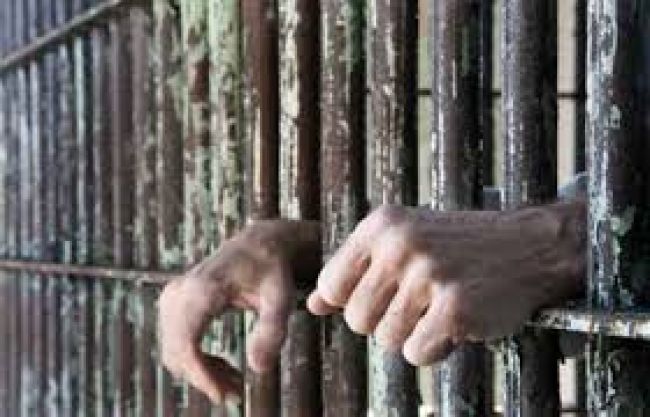Googl plus

Several sources reported that the Houthi coup militia operates 11 secret prisons in the city of Hodeidah under the supervision of one of the Houthi leaders in the governorate, within hundreds of secret prisons in the capital Sana'a and other governorates.
The sources confirmed that the 11 secret prisons out of a total of 70 prisons are distributed between departments of the directorates of security and the Criminal Investigation Department CID, and government buildings and others inside farms, institutions and civil associations and houses and huts of palm.
The sources explained that the Houthi militias are practicing the most brutal and deadly torture in these secret prisons, which are supervised and run by the Houthi leader, Abu Alaa al-'Umaisi, the in charge of the so-called preventive security in the governorate of Hodeidah.
In the capital Sana'a, identical sources reported that the Iranian Houthi militias have established new secret prisons to have capacity for dozens of abductees in the events known as the uprising of hungry in early October, after the storming of homes.
Hide, torture and murder
Unofficial statistics indicate that the coup militias are holding dozens of Yemeni abductees in their secret prisons and treating them with extreme cruelty, and that they practice torture against them.
Houthi secret prisons are spread in the capital Sana'a and the governorates controlled by the militia, especially in Dhamar, Amran and Hajjah. Two weeks ago, Undersecretary of the Ministry of Justice, Faisal al-Majidi, confirmed that tens of thousands of Yemenis are being held in hundreds of secret prisons belonging to the Houthi militia.
Yemeni human rights organizations confirmed that the number of victims of brutal torture in the prisons of the terrorist militia has risen to more than 132 victims since the coup against the legitimate authority in late 2014, and the last of these victims was the victim Yusuf Abdullah al-Muqbili, who died before the beginning of September in the military prison controlled by the militia in Sana'a after subjected to brutal torture, without allowing the body to be seen or handed over to its relatives.
A few days before that, the abductee Omar al-Riyami died in the prisons of the national security apparatus in Sanaa, controlled by the Houthi militias, a year after his abduction.
Over the past few years, the Iranian-backed militia has created hundreds of secret prisons and detention centers in which various types of torture and ill-treatment are practiced against political, media and human rights activists.
Observers confirm that the file of secret prisons belonging to the Houthi militia in Yemen is one of the most serious files that the United Nations and human rights organizations must take firm action to stop this blatant violation of human rights.
They considered the establishment of secret prisons of the militias is seen as a quotation from Iranian policies, which follow such an approach in a number of countries where they are present. The seriousness of these prisons lies in the size of the terrible torture that the prisoners subjected to, as well as the arrest of opponents of the militia's approach without charge. These prisons have enabled militia supervisors to blackmail the families of the abductees in order to pay money for the release or non-torture of their children.
The secret prisons created by the Houthi militia in government buildings, houses and schools occupied by militias are heavily guarded and no one is allowed to enter. These prisons contain politicians, journalists, media and human rights activists that are forcibly disappeared.
More than 10 journalists are still being held in the Political Security prison in Sana'a, controlled by the coup Houthi militias, subjecting to the worst treatment. Some of these journalists suffer from poor health conditions due to the severity of the torture they have suffered.
The abductees ffiliated to the Yemeni Islah Party, represent the vast majority of the abducted and forcibly disappeared, especially politicians, journalists and activists in the field of media and human rights, where Houthi considers them the main obstacle to complete his coup project.
The coup militias also deliberately conceal the identities of their supervisors of their prisons, giving them fake names and nicknames so as not to be identified in the future, for fear of being prosecuted.
The increase of prisons
The percentage of the secret prisons is not few comparing to the prisons' percentage run by Houthi militias in the areas controlled by them. The militia has turned the country into an open prison. This group opens a new prison every day, in addition to the prisons and public prosecution that belong to the state apparatus, which the militias have turned into prisons for opponents of its imamate coup project.
In the capital Sanaa, for example, the central prison is filled with hundreds of detainees, in addition to four prisons holding hundreds of prisoners inside. The most recent prison is the Habra prison, in which the abductees suffer daily from cruel treatment, in addition to police prisons and other prisons in government institutions.
In Dhamar governorate, there are hundreds of prisoners are being held in the “mentally disturbed” section inside the central prison and hundreds of others in the community college, as well as the police stations, CID and directorates' prisons. This is also what is happening in the governorate of Hodeidah and other governorates. One of the worst prisons is the prison of al-Kal'a in Radaa city, in which abductees died under torture.